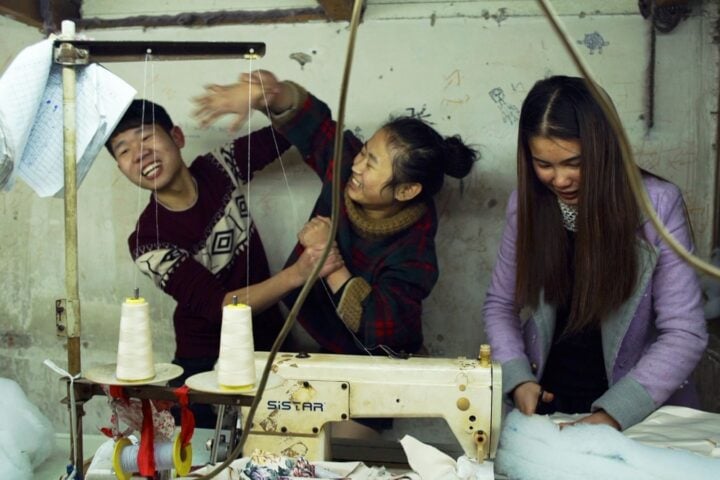Wang Bing’s Youth (Spring), the first in the filmmaker’s trilogy of documentaries about garment workers in Zhejiang province in eastern China, eschewed incident to stress the numbing quality of the manual labor and economic stagnation of its young migrant workers. The second installment in the trilogy, Youth (Hard Times), similarly leans into durational extremes but eventually and sneakily reveals a broadened scope.
Wang again keys us to the perspective of the workers, subjecting us to the constant roar of sewing machines until the din of routine is understood as that and becomes barely noticeable. The oscillation between scenes of toil and moments of rest in which laborers are too tired to do much of anything other than scroll on their phones conveys just how easy it is to become numb in such an environment. Indeed, at first it seems that the biggest change from the first film is in the slight shift from newly arrived young laborers to a group who, though barely in their 20s, have amassed enough on-the-job experience to act as mentors for the next wave of migrants.
Then, about an hour into Wang’s mammoth documentary, a young man who pressures his boss for his pay is assaulted by the overseer and his family, and after the boss lands in jail, his laborers are unsure of what to do. Faced with the twin anxieties of losing their subsistence pay and possibly their lodging if the factory is seized by the government, the young workers begin the process of organizing in order to bargain for jobs with textile shop owners and even the lowlifes who come snooping around attempting to buy up now-abandoned equipment.
In Youth (Hard Times), there’s a fascinating tension between the length of individual scenes and their documentation of the arduous process of worker organization, as well as the external and internal struggle with ingrained power dynamics between the average joe and the powers that be. There are numerous scenes that show workers divided on the subject of collective bargaining, with some so terrified of reprisals from private and public forces that they urge others to just keep their heads down and work for what pittance they can get. And when some do work up the courage to negotiate with shop owners for decent wages, the managers’ prepared stonewalling efforts drag on for so long that you can see the weariness set in on the migrants’ faces in real time as they take in the show of Kafkaesque doublespeak.
The film can be frustrating when it sticks to Wang’s general M.O. of constantly floating between subjects, preventing overidentification with any one person. More than once, a group appears on the cusp of a negotiating breakthrough, only for Wang’s camera to cut to other workers glumly accepting subsistence wages without a fight. Nonetheless, such moments speak to the film’s larger view of the daunting challenge of uniting the tens of thousands of exploited garment workers in the industrial zone of Zhili, a district of Huzhou City, let alone throughout China.
Wang’s work has never shied away from criticizing a modern, consumerist nation for failing to live up to the supposed socialist ideals of its revolution, but rarely has one of his films so nakedly called out the collusion between state and commerce to ensure the powerlessness of average citizens. The director typically cultivates a sense of detached, fly-on-the-wall observation, but here he more directly engages with his subjects. At times, he even audibly intrudes on people’s conversations to ask probing follow-up questions, and more than once, a few organizers acknowledge his presence and ask him not to film sensitive planning sessions.
At one point in the film, Wang even offers a rare direct interview with one young man who recounts getting caught up in a protest in his teenage years. Calmly relating how he was assaulted and manipulated by police, and how he was miraculously saved from an even worse beating and trumped-up charges, the man speaks with the haunted detachment of a war veteran. Making reference to how domestic news paints China in glowing terms night by night, he calls out this propaganda and says of the status quo: “Something’s wrong, isn’t there?”
Youth (Hard Times) can be optimistic, given the steps that some of these workers take to finally exert control over their lives. And yet, the fact that the most tangible marker of success in their organizing is the ability to scrounge up just enough money to go back home for the New Year holiday is a sobering reminder that their struggle is only just beginning.
Since 2001, we've brought you uncompromising, candid takes on the world of film, music, television, video games, theater, and more. Independently owned and operated publications like Slant have been hit hard in recent years, but we’re committed to keeping our content free and accessible—meaning no paywalls or fees.
If you like what we do, please consider subscribing to our Patreon or making a donation.





